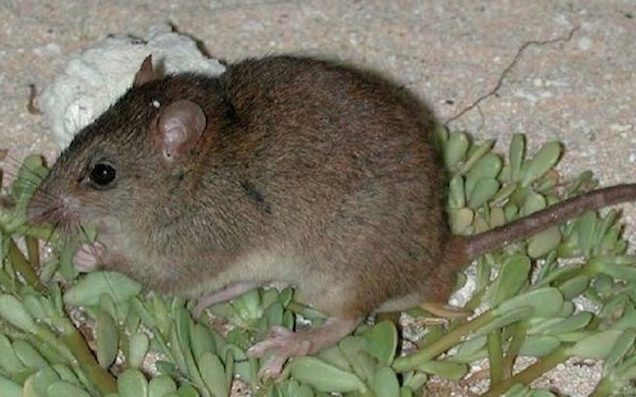
The government has this week quietly announced the extinction of the Bramble Cay melomys, believed to be the first species of mammal to go extinct due to man-made climate change.
The Bramble Cay melomys (Melomys rubicola) was a small species of rodent that, while still extant, was Australia’s most isolated mammal, living only on Bramble Cay, a tiny island of sand in the Torres Strait Islands that serves as Australia’s northernmost point of land.
In a press release issued on Monday from environment minister Melissa Price titled ‘Strong protection for threatened species‘, a line-item in a table of amended conversation statuses noted the movement of the Bramble Cay melomys from ‘Endangered’ to ‘Extinct’.
The International Union for Conservation of Nature, which monitors the the conservation status of animals globally, had already registered the animal as extinct back in 2016, citing the species’ decline since 1983, the absence of any sightings since 2009, failure to find the species after a limited search from 2009 to 2013, and failure to find the species after a “a comprehensive and adequate targeted search” back in 2014.
A report from that search, titled Confirmation of the extinction of the Bramble Cay
melomys Melomys rubicola on Bramble Cay, Torres Strait: results and conclusions from a
comprehensive survey in August–September 2014, considered that possibility that the Bramble Cay melomys could still exist elsewhere, but ultimately advised that “the conclusion that the Bramble Cay melomys does not occur elsewhere in the Torres Strait appears well justified“. According to the report, there are no records of the species on other islands nearby “despite considerable survey effort“, and the purported discovery of a Bramble Cay melomys on nearby Sassie Island around 1845 was never substantiated.
The report argued that the extinction of the species, if confirmed, could represent “the first recorded mammalian extinction due to anthropogenic climate change“, attributing its demise to “ocean inundation of the low-lying cay, very likely on multiple occasions, during the last decade, causing dramatic habitat loss and perhaps also direct mortality of individuals“. According to the report, human-induced climate change can be identified as the root cause of the species’ extinction through “[a]vailable information about sea-level rise and the increased frequency and intensity of weather events producing extreme high water levels and damaging storm surges” in the region.
Speaking at Senate estimates on Monday, assistant secretary of the Department of the Environment’s Protected Species and Communities Branch Geoff Richardson said that the decision was made to move the species to ‘Extinct’ after “five-plus years of no evidence of the species on the island“, adding that it’s not a decision they take lightly, because it means that the species will no longer get any protection.
Tim Beshara, the federal policy director for The Wilderness Society, issued a statement condemning the environment minister for essentially glossing over the species’ extinction:
Rather than properly acknowledging the extinction of the Bramble Cay melomys, the Environment Minister has buried it at the bottom of a media release with the euphemism “transfer from the Endangered Category to the Extinct Category”. What a way to mark the official extinction of an entire species.
The Bramble Cay melomys was a little brown rat. But it was our little brown rat and it was our responsibility to make sure it persisted. And we failed.
It was the only endemic mammal of the Great Barrier Reef and scientists have directly attributed its passing to climate change. Sea level rise and increased storm surges first removed the species’ food supplies and then ultimately washed the last vestiges of the population into the ocean.
Greens senator Janet Rice laid the blame at the feet of the government, saying that the recovery plan for the animal wasn’t implemented or reviewed.
RIP, the Bramble Cay melomys.



